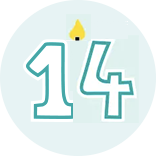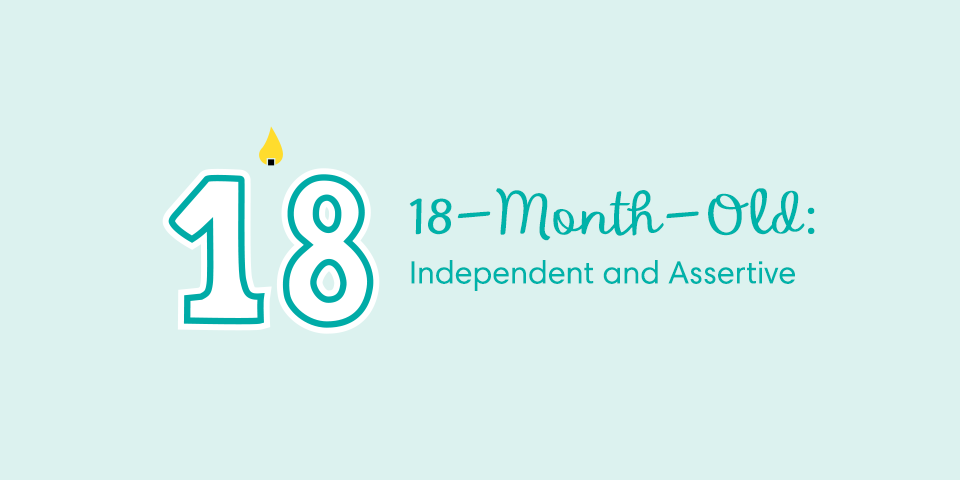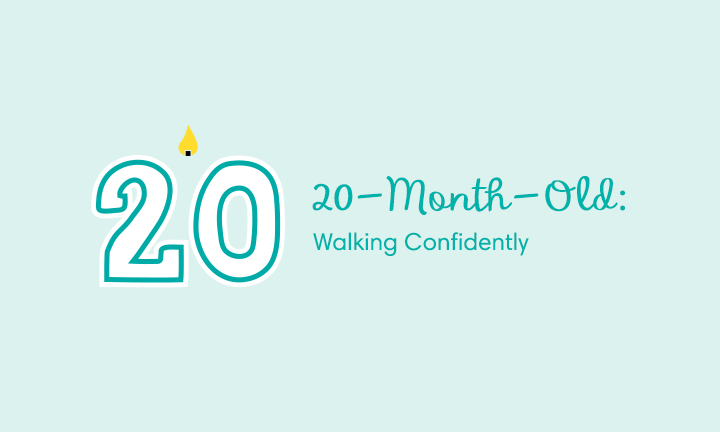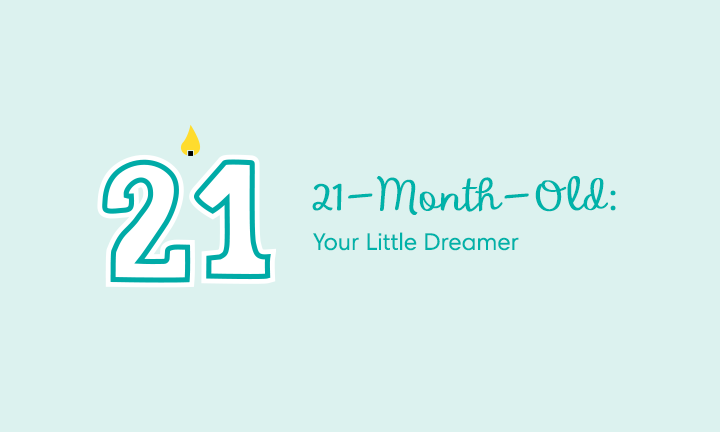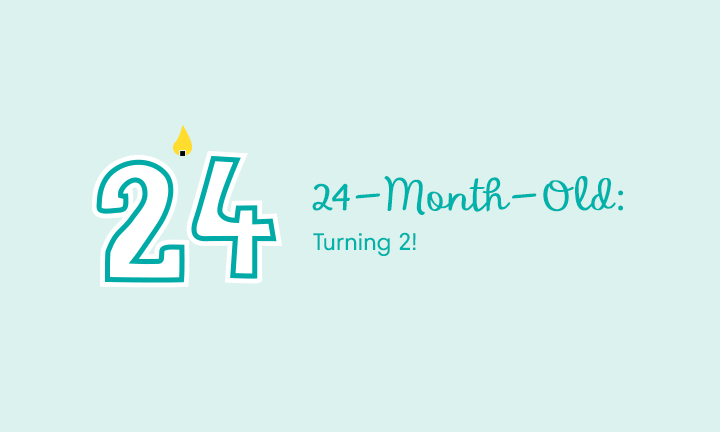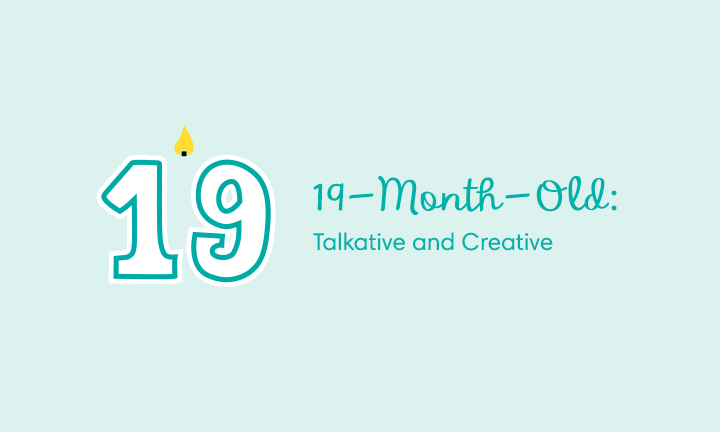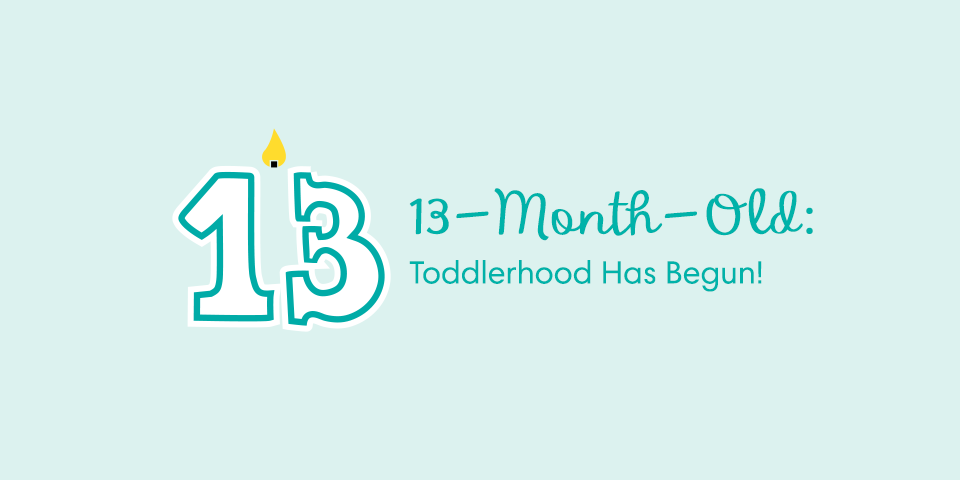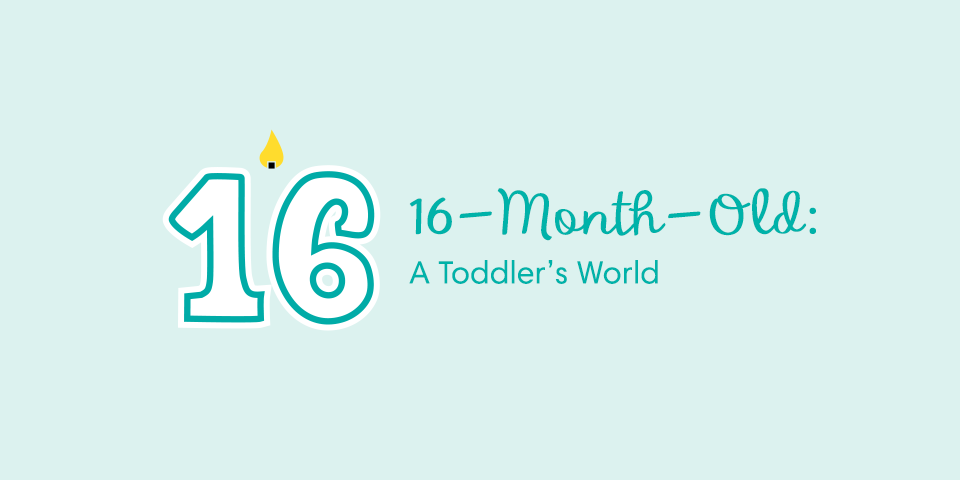Your 14-Month-Old’s Development and Milestones
At 14 months old your toddler may be revealing more and more of their personality. For example, you may find they understand more of what you say, and that they may be determined to keep going with a favorite activity even when it’s time for bed. There’s a lot you can do to support your toddler’s happy and healthy development, and to help them feel safe and secure while they explore the world in more independent ways. Find out which developmental milestones your 14-month-old may reach this month and learn how to navigate issues like separation anxiety and sibling dynamics.
Toddler Development Milestones
If you have an older child, or are connecting with other parents of young children, you probably have noticed a difference in when development milestones are reached by individual children. This is normal and expected, as each child is unique.
Think of the milestones listed here as the kinds of things you might observe around this time. Some may have happened a little earlier for your toddler, whereas others won’t occur until your child is older than 14 months. Consult your child’s healthcare provider if you’re ever concerned about your toddler’s development.
Language Comprehension
Have you noticed that your 14-month-old can point to their favorite stuffed animal when you ask them to show you where it is? Or that they’re waiting by their high chair when you tell them it’s snack time? This is happening because your toddler is understanding a lot more of what you’re saying.
To help boost your child’s comprehension and language skills, keep talking to them about what’s going on and respond to what they say and do. Speaking to them slowly and clearly, and using simple words and short sentences, will also help them understand. Around this time, you may find yourself using less “baby talk” as it’s no longer needed to get their attention.
Many parents wonder how many words a 14-month-old “should” say. But the fact is that every child is different and develops at their own pace, meaning that there is no fixed number of words that your 14-month-old “should” know or be using by now. Continue to have conversations with your child; these are crucial for boosting vocabulary and well as promoting overall language development. If your 14-month-old is not talking for whatever reason, consult their healthcare provider, who will be able to properly diagnose any developmental delays.
Flashes of Independence and Dependence
You might find your 14-month-old becoming bolder and more confident in their attitude and behavior. They might walk away from you to do something you’ve just told them not to do or play on their own in a more independent way than before. At other times, they might seem especially clingy, perhaps when they’re feeling tired or anxious.
The transition toward greater independence is not linear. For example, your child could be very independent for several days before suddenly becoming more dependent on you again.
This push-pull between wanting to be their own person and needing to be right next to you is normal, and it’s a sign that your toddler is getting used to the idea of growing up. Support your toddler by offering reassurance when needed. Don’t try to force something when they’re not feeling confident, as this may make them feel more insecure.
Separation Anxiety
It’s not unusual for a 14-month-old to put up a fuss when you leave them. One strategy that may help reduce separation anxiety is to let them know what’s happening: Tell them you’re going, that you’ll soon return, and then give them a quick kiss before leaving. Don’t sneak off, as this can make them fearful that you’ll disappear at any time. Plus, try not to reveal any anxiety of your own about the separation, which could make them fuss even more in the hopes that you’ll stay. Once you return, give them lots of attention. In time, they’ll understand that you’ll always return and that leaving doesn’t mean you don’t love them.
Self-feeding
Your 14-month-old is getting better and better at feeding themselves with a spoon or their fingers, and drinking from a cup, too. Although some of the food may not make it into their mouth, they’ll eventually achieve success.
Investing in unbreakable dishes and cups are a good idea, as they may be dropped or even flung from time to time. If your toddler does throw something like dishes or cutlery across the room, tell them that’s not allowed, and put things back where they belong. If your 14-month-old keeps dropping or throwing objects to see your reaction, it might be a good idea to take them out of the high chair and give them a chance to calm down before trying mealtime again later on.
Toddling
If your 14-month-old is walking, this may not look the way you expect, as it’s quite different from the way older children or adults walk. At this stage, toddlers step with a wide gait, toes pointed outward, and the steps can be shaky. Your child may seem to lurch forward from one foot to the other, with their arms bent at shoulder height for balance. It all looks very tentative and slow right now—particularly when they lose balance and fall—but it won’t be long before you’ll be running to catch up with them. And if your 14-month-old hasn’t taken their first steps yet, don’t worry. This is a development milestone that will likely be reached in the next few months.
Activities for Supporting Your 14-Month-Old Toddler’s Development
Wondering what are some things to do with a 14-month-old? Here are just some of the things you can do to support your 14-month-old’s development:
Mealtimes and Menus for Your 14-Month-Old
Your toddler will need about 1,000 calories worth of food a day—about three small meals and two hearty snacks—to keep them healthy and energized. Offer nutritious selections from the main food groups: proteins like meat and eggs; dairy products like cow’s milk and cheese; fruits and vegetables; and whole-grain cereals, pasta, or bread. If you think you may have a picky eater on your hands, there are ways to work with your little one.
Although a varied diet of healthy foods usually provides enough vitamins and minerals for most children, some children may need supplements. Your little one may need supplements of vitamins B2, B12, and calcium if your family follows a strict vegetarian diet. If your child drinks lots of cow’s milk, they may need an iron supplement. Your child’s healthcare provider will be able to recommend any needed supplements.
Your little one’s changing in ways big and small from one month to the next, but there’s one thing that will remain constant for a while yet—diapers! You deserve a reward for all those diaper changes. Download the Pampers Rewards app and get rewarded for all your Pampers purchases.
Your 14-Month-Old’s Sleep Schedule
Your toddler probably needs about 12 to 14 hours of sleep a day. Wondering how many naps a 14-month-old should take? At this stage they may be down to a single daily nap, as about half of all toddlers are by 15 months.
If your 14-month-old has recently started walking, you might find that they have a hard time winding down at naptime or bedtime, given the excitement of exploring the world on two feet. You may find that they won’t go to bed or you might see them walking back and forth in their crib as they practice this new skill.
This is OK; your toddler’s excited about their newfound mobility. Watch for signs of crabbiness and let them sleep then as opposed to following the sleep schedule that may have worked until recently. In time, the novelty of walking will wear off and your child will be easier to settle.
To help you track your 14-month-old’s nap and sleep schedule, download the Smart Sleep Coach app by Pampers. Cocreated by pediatricians and sleep experts, this easy-to-use app can come in handy when sleep training or when encountering difficulties like sleep regression.
A Day in the Life of Your 14-Month-Old Toddler
Life with a 14-month-old is never dull. So, what should a 14-month-old be doing? Here’s what a typical daily schedule might look like in your home:
Your Toddler’s Health: Keeping Safe Outside
As your 14-month-old becomes more mobile, it’s important to hold their hand and keep an eye on them when you’re out together. Don’t let them dart away from you, and be particularly vigilant when you’re near cars, such as on the street or in a parking lot, and anywhere around water. If your toddler tries to wriggle free from your grasp, you can say something like “I know you want to look over there, but I need to hold your hand to make sure you’re safe.”
You could also put extra locks on doors and gates, as well as installing baby gates or even alarms, to ensure your toddler can’t wander out of the house without your knowledge. It’s especially important that the pool and driveway are inaccessible to your 14-month-old.
Although many new cars come with a rear visibility system or an alarm that can detect movement behind the car, always double check that your toddler is not behind you as you back out of the driveway.
When it comes to car safety, be sure keep your car locked at all times, even when it’s in the garage. This helps prevent your toddler getting into the car and accidentally setting it in gear or becoming trapped in the car and developing heatstroke.
Development Tips for Your Toddler This Month
Consider the following tips and bonding methods to help encourage your 14-month-old toddler’s development:
Items You Will Need This Month
The following items and baby gear products may come in handy:
FAQS AT A GLANCE
Your 14-month-old may need one or two naps a day. About half of all toddlers at this age only have one nap a day.
Your Life as a Parent: Sibling Dynamics
If you have older children, you may notice a slight change in the dynamic now that your littlest one is a toddler. As we’ve described, your toddler is the center of their own universe, and this can make them behave in ways that your older children may find annoying.
Your 14-month-old might infringe on their siblings’ privacy, take things as their own, and throw a tantrum if those things are taken back. On the other hand, your older children may be jealous that your 14-month-old gets more of your attention.
Depending on the age of your older child, you may find they’re doing things, like misbehaving, just to get your attention. The sibling rivalry should diminish in the years to come as your children need less of your focused attention.
In the meantime, try to spend some quality time with each of your children. Perhaps have your partner, family member, or babysitter mind one while you enjoy some one-on-one time or a fun outing with the other, and vice versa.
If you’re planning to move your 14-month-old to a shared room in the future, there are some tips for creating a room for your toddler and older child to share.
Checklist for This Month
□ Coordinate with your partner about how you communicate around your toddler. You may find this has already happened organically, but now that your toddler understands more of what you say, you may like to agree with your partner to spell out certain words so that your 14-month-old can’t understand. For example, “Time for the P-A-R-K!” You may also want to remind each other to watch what you say around your little one, so that their growing vocabulary doesn’t accidentally include something a little more colorful than you’d expected.
□ Arrange for your child’s first haircut. If your toddler’s locks are getting quite long, it may be time for their first haircut! Of course, some children may have already had a trim, whereas for others it may be a little way off.
□ Create a dinner ideas list and meal plan. As things get busier at your home, you may find it helpful to create a weekly meal plan. This way you’ll know exactly what to buy, and you won’t be stuck on what to make. You might also like to keep a list of meals that are healthy and popular in your home so that when you don’t have inspiration you can look back at what’s worked in the past. You could even take photos of meals and save them on your phone so you can quickly flip through them when you’re looking for ideas.
□ Schedule your child’s 15-month well-child visit. Wondering how much a 14-month-old “should” weigh? At this checkup, your toddler’s healthcare provider will weigh and measure your child, checking their growth against the standard baby growth charts. As part of the exam, your child’s provider will check your little one’s vision, listen to the heart and lungs, and assess motor skills and behavior, as well as reviewing how sleeping and eating are going. Your child may also get booster vaccine doses as well as some first doses of certain vaccines, according to the latest immunization schedule.
□ For even more information, sign up to get our regular emails:
How We Wrote This Article The information in this article is based on the expert advice found in trusted medical and government sources, such as the American Academy of Pediatrics and the American College of Obstetricians and Gynecologists. You can find a full list of sources used for this article below. The content on this page should not replace professional medical advice. Always consult medical professionals for full diagnosis and treatment.
- American Academy of Pediatrics. Caring for Your Baby and Young Child: Birth to Age 5, 7th ed. (New York: Bantam Books, 2019).
- American Academy of Pediatrics. The Wonder Years. (New York: Bantam Dell, 2006).
- KidsHealth. “Your Child’s Checkup: 15 Months.”
